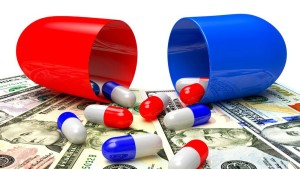Matthew Chapman , - Raw Story
Stephan: The question I ask, and that I think everyone should ask is this: Why aren't these pharmaceutical executives in prison for life for murder? They knew they were killing people by the tens of thousands, and making hundreds of millions of dollars doing it. Why isn't that murder for profit?

Credit: Shutterstock
On Friday, the Washington Post published excerpts from a damning series of emails released in a landmark case in Cleveland around the irresponsibility of drug manufacturers and suppliers in contributing to the opioid crisis.
In one email exchange, Victor Borelli, an account manager for pharmaceuticals corporation Mallinckrodt, told KeySource Medical vice president Steve Cochrane that 1,200 bottles of 30mg Oxycodone tablets had been shipped, to which Cochrane replied, “Keep ’em comin’! Flyin’ out of there. It’s like people are addicted to these things or something. Oh, wait, people are…” and Borelli responded, “Just like Doritos keep eating. We’ll make more.”
In another exchange, David Gustin, the regulatory director at pharmaceutical distributor McKesson, told colleagues he was upset about the “number of accounts we have that have large gaps between the amount of Oxy or Hydro they are allowed to buy (their threshold) and the amount they really need … This increases the ‘opportunity’ for diversion by exposing more product for introduction into the pipeline than may be being used for legitimate […]
No Comments
GILES PARKINSON, Founder and Editor - The Driven
Stephan: This is major news. If these tests work adaptation will be like the computer revolution spreading with extraordinary rapidity. The effect on the petroleum industry will be to make most of it irrelevant within a decade, at most 15 years. When was the last time you bought a roll of film to take pictures? Why would anyone buy gas if your car charged itself as it drove, or sat parked? Battery distance on a charge would become irrelevant?

The solar Prius
Credit: thedriven
Car manufacturing giant Toyota Motor Corp is to begin trialing later this month a new version of its Prius hybrid car, this time with up to 860 watts of thin-film solar that will be able to charge its “solar battery” as it drives, and add more than 50kms to its fossil fuel-free driving range.
The trials taking place in Japan use high efficiency (34 per cent) Sharp thin film solar cells situated on the bonnet (or hood), roof, rear hatch door and rear hatch door varnish.
The aim in the series of trial being co-ordinated by Toyota, Sharp and research organisation NEDO is try and reach 1kW output from solar panels on the car, which they see as a potential game changer – not just for hybrids, but also full battery electric vehicles.
 “The goal is to contribute to the creation of a new solar battery panel market, including […]
“The goal is to contribute to the creation of a new solar battery panel market, including […]
1 Comment
HELENA BOTTEMILLER EVICH, - Politico
Stephan: I have to confess that I don't see how anyone but a wealthy person could possibly be a Republican, and even then the Republican positions make no long term sense; everything they espouse or do is simply a short-term greed play. And it is going to get worse as long as they are in power.
The Trump Party not only isn't doing anything about climate change it is actively attempting to block or sabotage knowledge available to the public about climate change. Could that level of duplicity be the American reality? Am I exaggerating? Read this report.

The USDA’s climate resilience plan was supposed to be an update to a 2010 plan on climate science — a document that was released publicly during the Obama administration.
Credit: Getty
The Agriculture Department quashed the release of a sweeping plan on how to respond to climate change that was finalized in the early days of the Trump administration, according to a USDA employee with knowledge of the decision. (emphasis added)
Staff members across several USDA agencies drafted the multiyear plan that outlines how the department should help agriculture understand, adapt to and minimize the effects of climate change.
Top officials, however, decided not to release the plan and told staff members to keep it for internal use only, the employee told POLITICO. The person spoke on the condition of anonymity out of fear of retribution.
The goal was to map out “the science that USDA needs to pursue over the next five to eight years for the department to meet the needs of the nation,” according to the plan, Read the Full Article




 “The goal is to contribute to the creation of a new solar battery panel market, including […]
“The goal is to contribute to the creation of a new solar battery panel market, including […]








